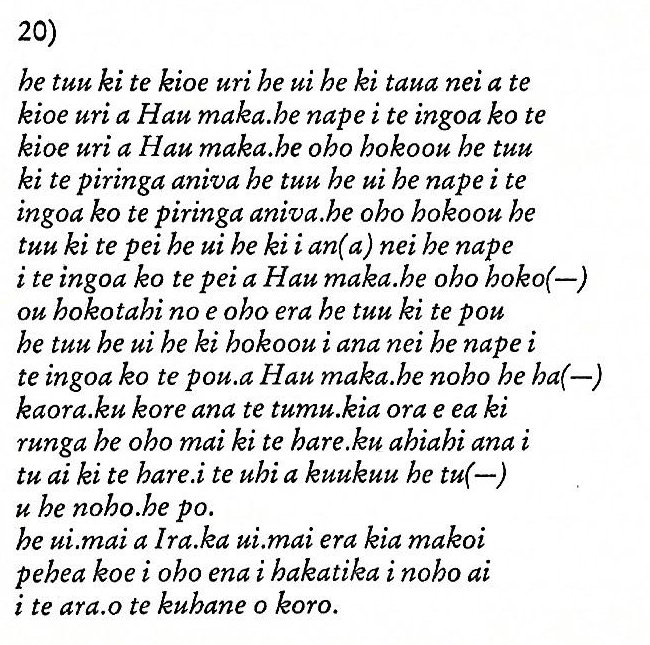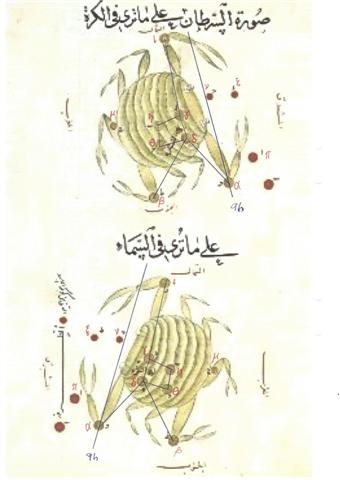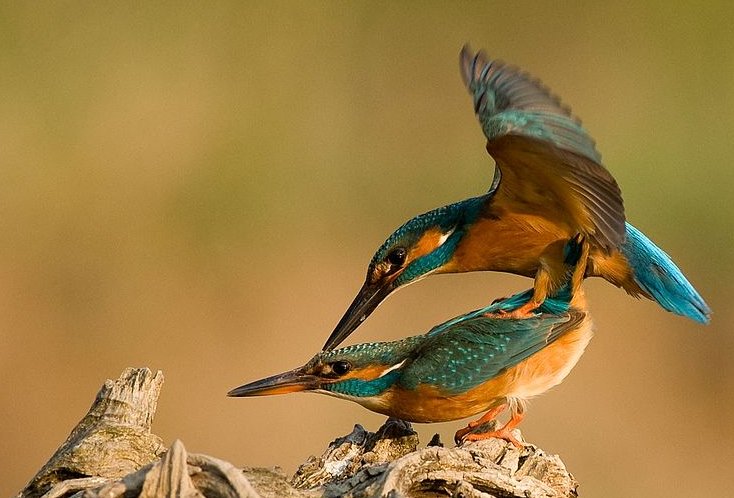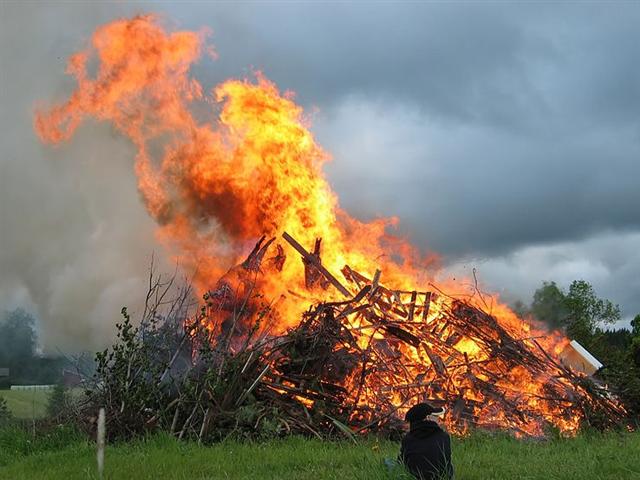
| he ki kia ira.he ro korua e aku hoa e.he |
He spoke to Ira, 'Hey you my
friends! How forgetful we (truly) are. This place is adequate (?
tau or 'beautiful'), the dark abyss lies there
peacefully!' Ira replied, 'And what should that remind us of
up here?'
All arose and climbed up. They went on and
arrived; they all had a good look [he ui riva] (at the inside of
the crater). They returned home and sat down. Night
fell, and they went to sleep [he noho he po he
moe].
When it grew light [he otea], Makoi arose again. |
| kokoepo to tatou i ana nei tau te poko u(-) |
| ri nei.e moe no a he ki mai a Ira.hee i runga |
| nei e moe mai nei.he ea anake he iri he oho |
| he tuu he ui riva anake.he
hoki ki te hare |
| he noho he po he moe.he otea he ea hokoou |
| a Makoi.he oho he rarama he oho |
|
E:20 |
| he tuu ki te kioe uri he ui he ki taua nei a
te |
He went off to further explore the
area. He went along and came to the 'dark rat'. He looked around
and said [he ki]: 'Here we are at the dark rat of Hau
Maka'. He gave it the name [he nape i te ingoa] 'Te Kioe
Uri A Hau Maka'. He went on [again, hokoou] and came to
Te Piringa Aniva. When he arrived there, he looked around and
gave the name 'Te Piringa Aniva'.
He went on and came to Te Pei, looked around, and said, 'Here
it is!' So he gave the name 'Te Pei A Hau Maka'.
He went on, all alone [hokotahi] he went on, and came to Te Pou. When he
arrived there, he looked around and again said 'Here it is!' [he
ki hokoou i ana nei] and gave the name 'Te Pou A Hau Maka'. |
| kioe uri a Hau maka.he
nape i te ingoa ko te |
| kioe uri a Hau maka.he
oho hokoou he tuu |
| ki te piringa aniva he tuu he ui
he nape i te |
| ingoa ko te piringa
aniva.he oho hokoou he |
| tuu ki te pei he ui he ki i an(a) nei
he nape |
| i te ingoa ko te pei a
Hau maka.he oho hoko(-) |
| ou hokotahi no e oho era he tuu ki te pou |
| he tuu he ui he ki hokoou i ana nei
he nape i |
| te ingoa ko te pou.a
Hau maka.he noho he ha(-) |
| Ki. To, towards (a place, a
person); after (time); for, in order to... Vanaga. Kî.
To say, to speak; word, language; will, wish (verbally
expressed): e-hakarogo koe ki te kî o toou matu'a, obey
you father's will. Vanaga. 1. In, toward, to, for, at; ki ra,
there; ki ra hoki, exactly there; ki aho, outside;
ki roto, within, into, inside, among. 2. In order that.
3. To say, to speak, to chat, to pronounce, to respond;
argument, conversation, description, doctrine, expression, word,
relation; ki veveveve, voluble; ki vaiapuga,
nonsense, to speak much and say nothing; ki ihoiho, to
speak forcefully. Churchill. Igoa. Name; igoa
nuinui, main name (of a country); he-nape i te igoa,
to give a name; igoa hakaponoko, nickname. Vanaga. |
| kaora.ku kore ana
te tumu.kia ora e ea ki |
He sat down [he noho] and rested [he
hakaora]. There was no bride-donor (tumu) to live with (?
kia ora). |
|
Noho. 1. To sit, to stay, to remain, to live
(somewhere), to wait; ka-noho, you stay! (i.e.
'good-bye', said by the person leaving). 2. Figuratively: he
noho te eve, to be calm, at peace; he noho te mana'u,
to concentrate on something, to fix one's attention on;
ku-noho á te mana'u o te tagata ki ruga ki te aga, the man
thinks constantly of his work. Vanaga. Seat, bench, dwelling,
marriage, position, posture, situation, session, sojourn; to
sit, to dwell, to reside, to rest, to halt, to inhabit;
noho hahatu, to sit
cross-legged; noho hakahaga,
apathy; noho heenua,
countryman; noho kaiga,
native; noho kenu,
married; noho ke noho ke,
to change place; noho muri,
to stay behind; noho noa,
invariable; noho opata,
to stand on a cliff; noho pagaha,
badly placed; noho pepe,
table; noho tahaga,
bachelor, unmarried; noho vie,
married, noho no,
apathy, stay-at-home, colonist, idler, inhabitant, inactive,
immobile, settler, lazy, loiterer.
Hakanoho, to abolish, to
rent, to lease, to enslave, to dissuade, to exclude, to exempt,
to install, to substitute, hostage.
Hakanohohia, stopped.
Nohoga, seat.
Nohoturi, to kneel,
genuflexion. Nohovaega,
to preside. Churchill. Ora.
1. Healthy; to recover, to be saved (from an illness
or a danger): ku-ora-á, ina kai mate, he recovered, he
did not die; ku-ora-á te haoa, the wound has healed;
e-ora-no-á, he is still alive; ora-hakaou mai, to
come back to life; ora ké, what a pleasant breeze! (lit:
how healthy!). 2. Stick for spinning top (made from the shell of
a sandalwood nut) with which children make the top spin. Vanaga.
1. December, January. Ora nui, November, October. 2. To
live, to exist, to draw breath, to survive, to subsist, to be
well, healthy, safe, to refresh, a pause, rest, ease; e ko
ora, incurable; ora tuhai, previous existence; ora
iho, to resuscitate, to revive; ora nui, vigorous;
oraga, life, existence; oraga roaroa, oraga roaroa
ke, oraga ina kai mou, immortality; oraga kore,
lifeless; oraga mau, oraga ihoiho, vivacious;
oraora, oraora no iti, to be better; hakaora,
to draw breath, to revive, to strengthen, healthy, to sanctify,
to animate, to save, to repose, to cure, to rest, to comfort, to
assuage; hakaora ina kai mou, to immortalize;
hakaoratagata, Messiah, Saviour. 3. To give water to; kua
ora te kevare, to water a horse; hakaunu ora, to
water. 4. To staunch, to stop the flow of a liquid. 5. To make
an escape; hakaora, to discharge, to deliver, to set
free. 6. To be awake (probably ara); hakaora to
guard. 7. A zephyr, light wind; kona ora, a breezy
spot; ahau ora, agreeable breeze. Churchill. Ola,
life, health, well-being, living, livelihood, means of support,
salvation; alive, living; curable, spared, recovered, healed; to
live; to spare, save, heal, grant life, survive, thrive. Ola
loa, long life, longevity, Ola 'ana, life, existence.
Wehewehe. The explorers reach Easter Island in a 'canoe' (vaka).
The name of their craft is given as Oraorangaru 'saved
from the billows' (Brown 1924:40) or Te Oraora-miro 'the
living-wood' (ME:58). The Routledge reference 'Each (man went)
on a piece of wood' (RM:278) also seems to refer to the name of
the canoe. As far back as 1934, the name was no longer
understood. I favor the following explanation: The difficulty in
interpreting the name of the canoe of the explorers arises from
the name segment oraora. To begin with, the compound form
oraora ngaru should be analyzed in comparison with
other Polynesian compounds, such as MAO. pare-ngaru 'that
which fends off the waves' (i.e., the hull of the boat), TAH.
tere-'aru 'that which moves through the waves' (i.e., riding
the waves on a board). There are several possible translations
for oraora as the reduplication of ora. Te
Oraora Miro can be translated as 'the pieces of wood,
tightly lashed together' (compare TAH. oraora 'to set
close together, to fit parts of a canoe') and be taken to refer
to the method of construction of the explorer canoe, while
Oraora Ngaru means 'that which parts the water like a
wedge', or 'that which saves (one) from the waves, that which is
stronger than the waves'. (Barthel 2)
Tumu. 1. Tree trunk. 2.
Ancestors: tumu matu'á, parents; tumu tupuna,
grandparents. By extension: tumu taína, members of
friendly families. 3. Como término muy especial se usa tumu
para se¤alar a familias o personas que no son parientes, de
modo que sus hijos podían, según antigua usanza, casarse entre
ellos y formar un nuevo tronco. 4. Origin of something;
initiator of an idea; person who is the cause of a fight:
tumu taûa. 5. He-kore te tumu, to be so weakened that
you cannot stand (lit.: the trunk is lacking). Vanaga. Base,
cause, element, origin, principle, source, spring, trunk,
occasion, author, subject, motive; ina e tumu,
accidental, fortuitous; tumu kore, causeless, baseless,
weak in the legs, to waver; tumu o te hakareka, toy;
tumu hatihati, weak in the legs; tumu o te hiriga,
purpose of the voyage. T Pau.: fakatumu, to lay a
foundation. Mgv., Mq., Ta.: tumu, cause, base, origin,
principle, trunk. Tumumeika (tumu - meika),
banana plant. Mgv., Mq.: tumumeika, id. Churchill.
... At Opoa,
at one of the last great gatherings of the Hau-pahu-nui,
for idolatrous worship, before the arrival of European ships, a
strange thing happened during our [the two priests of
Porapora, Auna-iti and Vai-au] solemn
festivity. Just at the close of the pa'i-atua ceremony,
there came a whirlwind which plucked off the head of a tall
spreading tamanu tree, named Paruru-mata'i-i-'a'ana
(Screen-from-wind-of-aggravating-crime), leaving the bare trunk
standing. This was very remarkable, as
tamanu wood is very hard and close-grained. Awe struck
the hearts of all present. The representatives of each people
looked at those of the other in silence for some time, until at
last a priest of Opoa named Vaità (Smitten-water)
exclaimed, - E homa, eaha ta 'outou e feruri nei?
(Friends, upon what are you meditating?) - Te feruri nei i te
tapa'o o teie ra'au i motu nei; a'ita te ra'au nei i motu mai te
po au'iu'i mai. (We are wondering what the breaking of this
tree may be ominous of; such a thing has not happened to our
trees from the remotest age), the people replied. Then Vaità
feeling inspired proceeded to tell the meaning of this strange
event… I see before me the meaning of this strange event! There
are coming the glorious children of the Trunk (God), who will
see these trees here, in Taputapuatea. In person, they
differ from us, yet they are the same as we, from the Trunk, and
they will possess this land. There will be an end to our present
customs, and the sacred birds of sea and land will come to mourn
over what this tree that is severed teaches. This unexpected
speech amazed the people and sages, and we enquired where such
people were to be found. Te haere mai nei na ni'a i te ho'e
pahi ama 'ore. (They are coming on a ship without an
outrigger), was Vaitàs reply. Then in order to illustrate
the subject, Vaità, seeing a large umete (wooden
trough) at hand, asked the king to send some men with it and
place it balanced with stones in the sea, which was quickly
done, and there the umete sat upon the waves with no
signs of upsetting amid the applauding shouts of the people ... |
| runga he oho mai ki te hare.ku
ahiahi ana i |
He got up, the path went uphill, and
he came (back) to the house. It was dark when he reached the
house. When he came to the yam plantation of Kuukuu, he sat
down. Night was falling. |
| tu ai ki te hare.i te
uhi a kuukuu he tu(-) |
| u he noho.he po. |
| Ku. Verbal prefix, used for
past events the effects of which are still lasting. The verb
then takes the suffix -ana which is very often contracted
to -á . In familiar conversation the prefix -ku is
often omitted and only the suffix -á is used. Vanaga. 1.
I; kia ku, me. 2. Verb sign: ku ohoa, to keep out
of the way, absence; ku higaa, convinced; ku taie te
tai, to overflow, to go beyond; ku magaro, to
reconcile. 3. ? tae he mau ku hoao, abundance. 4.
Akaku, to be moved, affected; hakaku, to groan. Mgv.:
ku, an exclamation, a cry used when one has hit the mark
aimed at. Mq.: ú, an exclamation of sorrow. 5. Gaoku,
to eat greedily. Mgv.: ku, to be satiated, glutted.
Churchill. Ahi. Fire; he-tutu i te ahi to light
a fire. Ahiahi = evening; ahiahi-ata, the last
moments of light before nightfall. Vanaga. 1. Candle, stove,
fire (vahi); ahi hakapura, match; ahi hakagaiei,
firebrand waved as a night signal. P Mgv.: ahi, fire,
flame. Mq.: ahi, fire, match, percussion cap. Ta.: ahi,
fire, percussion cap, wick, stove. 2. To be night; agatahi
ahi atu, day before yesterday. 3. Pau.: ahi,
sandalwood. Ta.: ahi, id. Mq.: auahi, a variety of
breadfruit. Sa.: asi, sandalwood. Ha.: ili-ahi,
id. Ahiahi, afternoon, night; kai ahiahi, supper.
P Pau., Mgv., Mq., Ta.: ahiahi, afternoon, evening.
Ahipipi (ahi 1 - pipi 2) a spark, to flash.
Churchill.
Po. 1. Night; to
get dark, to fall (of night): he-po, it is getting dark.
Formerly used, with or without raá, in the meaning of a
whole day: po tahi, one day; katahi te kauatu marima
po, fifteen days; po tahi raá, first day of the week;
po rua raá, po toru raá, second, third day, etc. 2. Alone
or as po nui, used to express the idea of good luck,
happiness. He-avai-atu au to'ou po, I wish you good luck
(when taking leave of someone). Very common was this parting
formula: aná po noho ki a koe! good luck to you! Po-á,
morning; i te po-á, in the morning; i te po-era-á,
very early in the morning. Po-ará, quickly, rapidly,
swiftly: he-iri po-ará, go up quick; he-ta'o itau umu
era po-ará, he cooked it quickly. Po-e-mahina,
formerly used of sleep-walkers (haha a po). Vanaga. 1.
Darkness, night, late; po haha, dark night, gloom. P Tu.
po-tagotago, darkness. Mgv., Mq., Ta.: po,
darkness, night. 2. Calendar day; po e rua, Tuesday;
po o te tagata, life. P Pau., Mgv., Mq., Ta.: po,
calendar day. Churchill.
 |
 |
 |
 |
 |
|
Aa1-19 |
Aa1-21 |
Aa1-25 |
Aa1-31 |
Aa1-36 |
|
i
uhi
tapamea |
e
uhi
tapamea |
e
uhi
tapamea |
e
uhi tapamea |
e
uhi tapamea |
 |
 |
|
Aa1-17 |
Aa1-23 |
|
ka
tapamea |
e
hokohuki |
 |
 |
 |
|
Aa1-27 |
Aa1-29 |
Aa1-34 |
|
ki
te
henua |
ma
te
hokohuki |
te
tapamea |
|
| he ui.mai a Ira.ka ui.mai era kia makoi |
Ira asked Makoi the following
question: 'How did you fare when you wandered, when you went
searching, when you found yourself on the path of the dream soul
of the father?' |
| pehea koe i oho ena i hakatika i noho ai |
| i te ara.o te kuhane o
koro. |
| Ara. 1. Road, path; ladder.
2. To wake up, to concentrate on something; he-ara te mata,
to inspect attentively; hé-ara, he-ûi a raro o te vai
kava, concentrating, he looked at the sea-bottom. Ará-ará,
to signal, to send signals with the hand (to another person in
the distance): he-haaki-atu hai rima ará-ará. Vanaga. 1.
Path, trail, road, way. 2. a. To awake, to arouse; veve ara,
to awaken; hakaara, to arouse, to excite. b. To be awake;
hakaara, to be awake; ara no, insomnia,
sleeplessness. c. To watch, to guard; tagata ara,
sentinel. Churchill. Koro. 1. Father (seems to be an
older word than matu'a tamâroa). 2. Feast, festival; this
is the generic term for feasts featuring songs and banquetting;
koro hakaopo, feast where men and women danced. 3. When
(also: ana koro); ana koro oho au ki Anakena, when
I go to Anakena; in case, koro haga e îa,
in case he wants it. Vanaga. If. Korokoro, To clack the
tongue (kurukuru). Churchill. Ma.: aokoro,
pukoro, a halo around the moon. Vi.: virikoro, a
circle around the moon. There is a complete accord from Efaté
through Viti to Polynesia in the main use of this stem and in
the particular use which is set to itself apart. In Efaté
koro answers equally well for fence and for halo. In the
marked advance which characterizes social life in Viti and among
the Maori the need has been felt of qualifying koro in
some distinctive manner when its reference is celestial. In Viti
virimbai has the meaning of putting up a fence (mbai
fence); viri does not appear independently in this use,
but it is undoubtedly homogenetic with Samoan vili, which
has a basic meaning of going around; virikoro then
signifies the ring-fence-that-goes-around, sc. the moon. In the
Maori, aokoro is the cloud-fence. Churchill 2. |
|
Nga Kope
Ririva Tutuu Vai |
A Te Taanga |
|
Hanga Te
Pau (named in Te Maro 1, 152) |
Ko Te Tomonga
O Ira |
|
3 Pu Mahore |
A Hau Maka O
Hiva |
|
Counting from the preceding
"January 1 this was day 531 (= 365 + 166). In
other words Pu Mahore A Hau Maka O Hiva
was at the position of 18 lunar synodic months.
Here was 18 * 29½ = 531. Here
was 'the fish Mahore, who was in a (water) hole
to spawn'.
...
he oho mai te kuhane o hau maka.he tomo ki uta
ki te kainga.he ui te kuhane ko te mahore
ka noho i roto i te pu ...
... P Pau.: kake, to climb, to
ascend. Mgv.: kake,
the arrival of shoals
of spawning fish. Mq.: kake,
to climb up a valley ...
 |
 |
|
manu kake |
Ga3-1 (60) |
|
|
HE
HURI
MAI TE ARINGA (He turned his face around)
 |
|
2 Poko Uri |
A Hau Maka I
[Sic!] Hiva |
|
I. 1. Preposition
denoting the accusative: o te hanau eepe
i-hoa i te pureva mai Poike ki tai, the
hanau eepe threw the stones of Poike into
the sea. Te rua muraki era i a Hotu Matu'a.
the grave where they buried Hotu Matu'a. 2.
Preposition: for, because of, by action of, for
reason of..., ku-rari-á te henua i te ûa
the ground is soaked by the rain; i te
matu'a-ana te hakaúru i te kai mo taana poki
huru hare, the mother herself carries (lit.:
by the mother herself the taking...) the food
for her son secluded in the house. 3.
Preposition: in, on, at (space): i te kaiga
nei, on this island. 4. Preposition: in, on
(time): i mu'a, before; i agataiahi,
yesterday; i agapó, tonight; i te
poá, in the morning. 5. Preposition: in the
power of: i a îa te ao, the command was
in his power. 6. Adverb of place: here. i au
nei, I am here (also: i au i, here I
am, here). Vanaga. Î. Full; ku-î-á te kete i
te kumara, the bag is full of sweet
potatoes. 2. To abound, to be plentiful; ki î
te îka i uta, as there are lots of fish on
the beach. 3. To start crying (of a baby):
i-ûi-era te ma-tu'a ku-î-á te poki mo tagi,
he-ma'u kihaho, when a mother saw that her
baby was starting to cry she would take it
outside. Vanaga. Toward; i muri oo na, to
accompany. Churchill. Ii, to deteriorate,
to go bad. Churchill.
 |
|
1 Te Manavai |
A Hau Maka O
Hiva |
|
Manava, Abdomen, belly,
(fig.) affection, sensitivity, feelings; manava
more, grief; manava mate, infatuated, in
love (with something); ku-ká-á te manava,
flared up, infuriated, irate; he-kava te manava,
offended, to turn sour, embittered. See also hatu
(manava hatu). Vanaga. Belly, abdomen,
entrails, interior; manava ahuahu,
indigestion; manava hanohano, high tempered,
to annoy; manava itiiti, frugal; manava
karavarava, colic; manava mate, to be in
ecstasy, passion, intensity of affection; manava
more, to desolate; manava ninihi, colic;
manava nuinui, appetite; manava pagaha,
affected, to complain; manava rakerake, bad
character; manava riri, anger; manava ru,
complaint; manava ruru, alarm, consternation,
emotion, swoon; manava tagi, eager; manava
tiha, out of breath; manava topa ki raro,
humble, to humiliate; manava vai, simpleton,
to have dull senses; meniri ko manava, little
finger; kakari manavai,
waist; manava eete, to shudder, to
tremble, to astonish; anger, fright, consternation;
manava eete ki te mau mea ananake,
susceptible; eete manava, affected, moved;
manava pohi, hasty, cruel, penitent; contrition,
indignation; kokoma hanohano manava pohi, to
abhor; manava pohi nunui ke, implacable. P
Pau.: manava, the interior, affected,
touched. Mgv.: manava, the belly, spirit,
conscience. Mq.: menava, respiration, pulse.
Ta.: manava, belly, entrails. Churchill. |
|
Te Kioe Uri
(named in Te Maro 15, 166) |
A Hau Maka |
|
Te Piringa Aniva
(named in Te Maro 15, 166) |
- |
|
Te Pei (named in
Te Maro 15, 166) |
A Hau Maka |
|
Te Pou (named in
Te Maro 15, 166) |
A Hau Maka |
|
Hua Reva |
A Hau Maka O
Hiva |
|
Akahanga |
|
Hatinga Te
Kohe |
|
Roto Iri Are |
|
Tama He Ika
Kino He Ihu Roroa |
|
One Tea
|
A Hau Maka O
Hiva |
|
Hanga Takaure |
|
Poike |
|
Pua Katiki |
|
Maunga
Teatea |
|
Mahatua |
|
Taharoa |
|
Hanga
Hoonu |
|
Rangi
Meamea |
|
Peke Tau O
Hiti |
|
Maunga Hau
Epa |
|
Oromanga |
|
Hanga
Moria One |
|
Papa O Pea |
|
Ahu Akapu |
|
Te
Pito O Te Kainga |
| tagata mau
matagi |
ihe toga maa |
ura hia |
tagata maú
kihikihi erua |
|
Ura. Ura, lobster. Ûra, flame,
blaze (ûra ahi), to become furious (with
manava as subject: ku-ûra-á te manava).
Úraúra, bright red. Vanaga. 1. Crayfish,
lobster, prawn. P Mgv.: ura, crayfish.
Mq.: uá, lobster. Ta.: oura,
crayfish, lobster. 2. Fire, burning, to be in
flames; uraga, combustion, flame, torch;
hakaura, to cause to glow, to kindle, to
light. P Mgv., Ta.: ura, a flame, to
burn. Mq: uá, id. Uraga, burden,
load, weight. Uraura, vermilion, scarlet.
P Pau.: kurakura, red. Mgv.: uraura,
an inflamed countenance. Mq.: uáuá, red,
ruddy. Ta.: uraura, red. Churchill.

Koura. 1. Fry, spawn,
roe. 2. Flea. P Mgv.: ura, crayfish,
lobster. Mq.: koua, ua, id. Ta.:
oura, id. The preface ko to the
stem ula distinguishes the Tongafiti. We
therefore assign the word in Rapanui and Tahiti
to a Tongafiti source, in Mangareva to a
Proto-Samoan source, and Marquesas shows both
... Rapanui is the only language which defines
the flea otherwise than in terms of the louse,
commonly kutufiti the jumping louse.
Pediculus is ancestral in the South Sea, the
flea seams to have been contributed by the first
of the explorers. Churchill. |
 |
 |
 |
 |
|
Cb5-4 |
Cb5-5 |
Cb5-6 |
Cb5-7 (101) |
|
CLOSE TO THE
FULL MOON: |
|
AL
TARF (The End) = β Cancri
(124.3)
RAS
ALGETHI (α Herculis)
|
χ Cancri (125.2),
BRIGHT
FIRE
= λ Cancri
(125.4)
*84.0 = *125.4 - *41.4 |
AVIOR = ε Carinae
(126.4), φ Cancri (126.8)
*85.0 = *126.4 - *41.4 |
ο Ursa Majoris (127.4)
*86.0 = *127.4 - *41.4 |
|
July
23 (204) |
24 |
25 (193 + 13 = 175 +
31) |
26 |
|
"June
12 |
13
(164) |
14 |
TE MARO 15 (531) |
 |
 |
 |
 |
 |
|
Ga3-1 (60) |
Ga3-2 (61) |
Ga3-3 |
Ga3-4 |
|
CLOSE TO THE
SUN: |
|
July
23 (204) |
24 |
25 (193 + 13 = 175 +
31) |
26 |
|